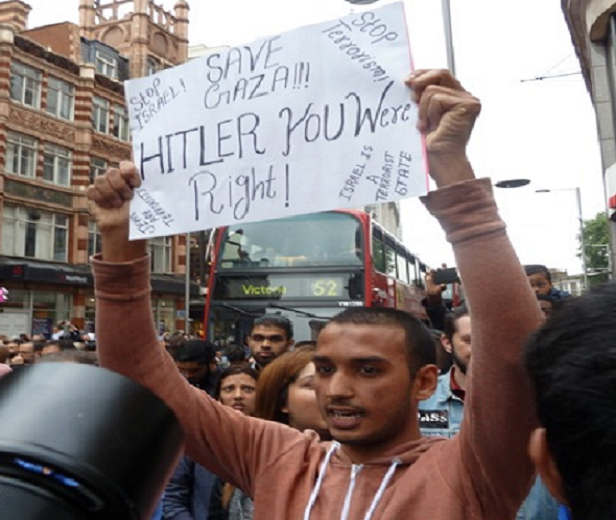Twitter Asbos would squeeze freedom of expression without curbing anti-Semitic hatred

Last week, the Community Security Trust, a charity that records attacks and harassment against Jews living in the UK, recorded 1,168 anti-Semitic incidents in 2014 — double the figure reported in the previous year.
On Monday, a group of British MPs published a report noting that whenever there is heightened conflict in the Middle-East, the rate of crime against Jews in the UK increases. The All-Party Parliamentary Group Against Antisemitism (APPGAA) also noted that the problem "continues to emanate from Islamist extremists, far-left and far-right groups" and made a number of recommendations to government, the police and the media to combat the issue.
The APPGAA report singles out social media as "a breeding ground for serious discriminatory and racist content" and recommends that the Crown Prosecution Service explores the use of prevention orders in cases where someone has been prosecuted for cyber-hate. Offenders would have their devices confiscated and be banned from using social media. The newspapers have labelled this idea 'Twitter ASBOs'.
In developing this recommendation, the APPGAA discusses the Communications Act 2003, which criminalises 'grossly offensive' messages sent online. This is a problematic part of our law. 'Grossly offensive' is highly subjective, and there have been cases where obviously political or religious speech has been prosecuted under the Act. In recent years the CPS has prosecuted far fewer people under this law, but if there is a renewed vigour in prosecuting such messages, it is highly likely that more people expressing religious or political views will find themselves in the dock on charges of 'offence'.
The APPGAA's call for restrictions on the use of social media comes in the context of a systematic squeezing of free speech online. Last year, Parliament increased the possible sentence for a conviction under s.1. of the Malicious Communications Act 1988. Twitter Asbos may seem benign in themselves, and it is clear the Members of Parliament who authored the report intend them to be used carefully. But the proposals are part of a pattern that squeezes freedom of expression and invites overreach.
'Twitter Asbos may seem benign in themselves, but the proposals are part of a pattern that squeezes freedom of expression and invites overreach.'
The terrible irony of this proposal is that, while it will probably lead to an unintended chill on legitimate free speech, it is doubtful that it will be effective at combating anti-Semitism. The idea of an ongoing order that will stop people using the Internet has a whiff of King Canute about it.
Anyone can register a new email address and Twitter account to post whatever they want. Those who find their usernames banned, blocked or even subject to a court order will simply be able to register another username to circumvent the restrictions.
Such orders would only be enforceable if accompanied by stringent surveillance of the ex-offenders, which brings its own civil liberties concerns as well as issues of cost.
In the meantime, such laws create 'free speech martyrs'. When the notorious historian David Irving was imprisoned in Austria for giving lectures denying the Holocaust, he became a cause célèbre for those of a similar mindset. He was able to invoke the notion of a totalitarian spectre shutting down free speech. The Far Right often use such rhetoric, claiming the mythical Politically Correct Brigade is frightened of "the truth". Those who want to believe anti-Semitic smears will readily believe that they, too, are a persecuted minority.

The APPGAA report does note that "a residual benefit of hate material appearing online, of course, is that it is relatively easy to report". It is certainly the case that censoring hate speech just sends it underground.
If a person cannot use Twitter as an outlet for his views, they will use some other method that we find harder to track. The authorities are left with the impression that the problem has been dealt with, but the racists' sentiments fester in places where they cannot be challenged.
It is far better to have the bigotry out in the open where it can be challenged, rather than sweeping it under a legal carpet. Whenever the claims of far-right groups are actually scrutinised they are exposed as ill-considered. Their views are often an emotional response to a deeper unease in society — a symptom of something larger, rather than a considered political position.
Ridiculous and morally questionable
Those on the frontline of the battle against anti-Semitism must find the critiques of free speech activists extremely frustrating. Are we to simply stand-by and watch as the unpleasant and divisive language increases? Certainly not. Indeed, I think it is ridiculous and morally questionable to campaign for the right to free speech, and then not utilise that right to combat and counter racism.
As Sir Bernard Hogan-Howe said this week, "we need society to become as vocally intolerant of faith hatred as it is of other forms of discrimination." Such 'vocal intolerance' begins on Twitter, where ordinary people can take a stand against anti-Semitism wherever they find it.
To properly eradicate anti-Semitism, we need more opportunities for cultural exchange and to hear the stories of the Jewish diaspora. The APPGAA recognises this, suggesting more educational measures for schools, and inter-faith initiatives. Public events like the Holocaust Memorial Day are essential.
To this list, I would add another crucial project—the promotion of Jewish literature. Where better to learn more about, and empathise with, the Jewish community than through its literary culture? Jewish Book Week, the JQ-Wingate Prize and the Amy Levy Prize are desperately important and deserve our support.
For its part, my own organisation English PEN has supported the translation of books like Ruth Maier's Diary, The Dove Flyer, The Patagonian Hare and Back To Back, all of which speak to the complex and often difficult nature of the Jewish experience.
All of these literary initiatives are only possible because we have robust free speech protections in this country. We must use our own right to free speech to counter the anti-Semitic narrative and replace it with something far more positive.
This is a long-term approach that does not provide the satisfaction of yet another law that bans certain kinds of speech. But it is imperative that we focus on the underlying problem, and not be distracted by 140-character manifestations of hatred that we see on social media.
Robert Sharp is head of campaigns at English PEN. For more on Robert, go to his author page here.
© Copyright IBTimes 2025. All rights reserved.





















